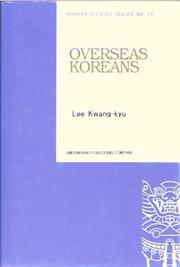| Listing 1 - 10 of 146 | << page >> |
Sort by
|
Book
Year: 2006 Publisher: Kyoto: International research center for Japanese studies,
Abstract | Keywords | Export | Availability | Bookmark
 Loading...
Loading...Choose an application
- Reference Manager
- EndNote
- RefWorks (Direct export to RefWorks)
Book
ISBN: 179362755X 9781793627551 9781793627544 Year: 2024 Publisher: Lanham Lexington
Abstract | Keywords | Export | Availability | Bookmark
 Loading...
Loading...Choose an application
- Reference Manager
- EndNote
- RefWorks (Direct export to RefWorks)
Hyoungah Park interviews fifty-eight North Korean migrants in China and analyzes their stories, exploring why they decided to escape North Korea despite the risks, how they escaped, and their experiences victimized by human trafficking.

ISBN: 8988095189 Year: 2000 Publisher: Seoul Jimoondang
Abstract | Keywords | Export | Availability | Bookmark
 Loading...
Loading...Choose an application
- Reference Manager
- EndNote
- RefWorks (Direct export to RefWorks)
Book
Abstract | Keywords | Export | Availability | Bookmark
 Loading...
Loading...Choose an application
- Reference Manager
- EndNote
- RefWorks (Direct export to RefWorks)
Book
Year: 1967 Publisher: Berkeley : University of California Press,
Abstract | Keywords | Export | Availability | Bookmark
 Loading...
Loading...Choose an application
- Reference Manager
- EndNote
- RefWorks (Direct export to RefWorks)
Book
Year: 1951 Publisher: New York : International Secretariat, Institute of Pacific Relations,
Abstract | Keywords | Export | Availability | Bookmark
 Loading...
Loading...Choose an application
- Reference Manager
- EndNote
- RefWorks (Direct export to RefWorks)
Book
Abstract | Keywords | Export | Availability | Bookmark
Book
ISBN: 1350988839 1786731851 1786721856 Year: 2017 Publisher: London ; New York : Bloomsbury Publishing,
Abstract | Keywords | Export | Availability | Bookmark
 Loading...
Loading...Choose an application
- Reference Manager
- EndNote
- RefWorks (Direct export to RefWorks)
"The indistinct status of the Zainichi has meant that, since the late 1940s, two ethnic Korean associations, the Chongryun (pro-North) and the Mindan (pro-South) have been vying for political loyalty from the Zainichi, with both groups initially opposing their assimilation in Japan. Unlike the Korean diasporas living in Russia, China or the US, the Zainichi have become sharply divided along political lines as a result. Myung Ja Kim examines Japan's changing national policies towards the Zainichi in order to understand why this group has not been fully integrated into Japan. Through the prism of this ethnically Korean community, the book reveals the dynamics of alliances and alignments in East Asia, including the rise of China as an economic superpower, the security threat posed by North Korea and the diminishing alliance between Japan and the US. Taking a post-war historical perspective, the research reveals why the Zainichi are vital to Japan's state policy revisionist aims to increase its power internationally and how they were used to increase the country's geopolitical leverage.With a focus on International Relations, this book provides an important analysis of the mechanisms that lie behind nation-building policy, showing the conditions controlling a host state's treatment of diasporic groups."--Bloomsbury Publishing.
Koreans --- Japan --- Ethnic relations.
Book
ISBN: 9788962620085 Year: 2009 Publisher: 서울 도서출판 동아시아
Abstract | Keywords | Export | Availability | Bookmark
 Loading...
Loading...Choose an application
- Reference Manager
- EndNote
- RefWorks (Direct export to RefWorks)
Koreans --- Migrations --- Social conditions
Book
ISBN: 9788971057452 Year: 2010 Publisher: 성남 한국학중앙연구원
Abstract | Keywords | Export | Availability | Bookmark
| Listing 1 - 10 of 146 | << page >> |
Sort by
|

 Search
Search Feedback
Feedback About UniCat
About UniCat  Help
Help News
News